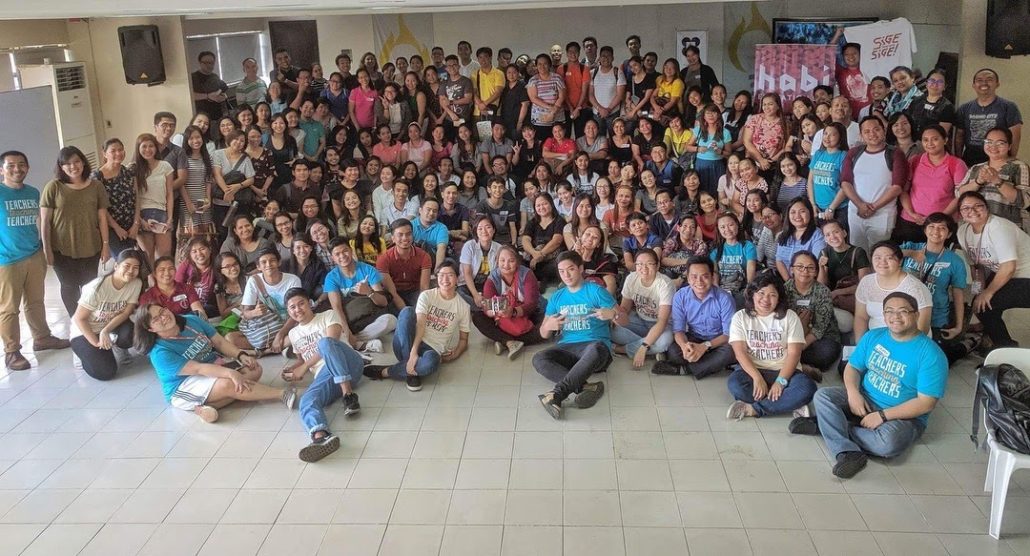I arrived at Philippine Science High School a little before seven am. I thought I was going to be tardy after sleeping through my alarm, but surprisingly traffic moved with semi-fluidity, letting Waze navigate the Grab easily from one street to the next without any troublesome detours. We had 100 or so teachers coming, with most of them not knowing what to expect when they arrive at eight am, so order was of utmost necessity before the imminent entropy.
In teams of two, we lugged materials up three flights of stairs, with the jugs of water gifted to me and another intern. We arranged chairs in curved rows, decorated doors with colorful flags, and survived a masking tape shortage by creatively recycling used tapes and strictly rationing the remaining few — all within an hour.
Habi had done Teachers Teaching Teachers (TTT) once before in 2015. In that event, the key take away was that “rather than just teaching what you know or absorbing what you don’t… [TTT provided] an opportunity for organic discussions as well as an exercise in asserting authority over your own learning.” Which made sense since the structure of TTT ensured that participants were both student and teacher, expected to teach and learn from each other in three 45 minute sessions. However, getting there was a logistical challenge.
Scores of teachers were registered, seated, and let loose with a pen or pencil and worksheets in hand. They nominated topics of the day and voted for the ones they wanted to attend. In a whirlwind of bodies and papers, suggestions were grouped into themes like history, sign language, mental health, and classroom management to name a few, and divided into three sessions, with seven different topics facilitated in each session.
 I facilitated three of the topics, one for each session: gamifying learning, using research in the classroom, and teaching history. With the help of a few of the participants, we shaped the chairs in a circle; I gave a scripted introduction and let the participants take the helm. What came next were a few awkward laughs, some clarifying remarks, and eyes fidgeting for my attention in an attempt to coax me to take lead. I reassured them that it was their session and it was up to them to decide where things would go. Confidently, a young teacher stood up and read out loud the definition of games and things started to take form. The next session rolled around with less awkwardness than the first, but formalities still coated the exchanges between participants.
I facilitated three of the topics, one for each session: gamifying learning, using research in the classroom, and teaching history. With the help of a few of the participants, we shaped the chairs in a circle; I gave a scripted introduction and let the participants take the helm. What came next were a few awkward laughs, some clarifying remarks, and eyes fidgeting for my attention in an attempt to coax me to take lead. I reassured them that it was their session and it was up to them to decide where things would go. Confidently, a young teacher stood up and read out loud the definition of games and things started to take form. The next session rolled around with less awkwardness than the first, but formalities still coated the exchanges between participants.
Then it happened. A conversation between teachers broke me from the mechanical processions of the day and made me realize the timeliness of having teachers teach and learn from each other.
The last session’s topic discussed teaching history in the classroom. Ferdinand Marcos and Martial Law dominated the topic of conversation immediately. Different perspectives of Marcos and Martial Law surfaced and a range of affects, from passionate to disinterested, manifested on the participants’ faces.
And in this exchange I realized that I had become too complacent, too fixated on the mundane tasks of being an educator, that I lost sight of what it meant to be a teacher.
Teachers act as one of the first touchstones of children who then base a big part of their knowledge and judgment on what they’ve learned from them. There is, in this contractual relationship between teachers and those whom they teach, an ethical responsibility of the former to ensure that what they disseminate to the latter approach the contours of reality, always seeking truth.
As a student of history and a product of the education system, both in the Philippines and abroad, I’ve seen ethics compromised in different ways: be it to push a political agenda or just a dewy, uncritical understanding of the material. Thankfully, a flock of teachers enthusiastically sacrificing a well-deserved day off to teach, and most importantly, learn from each other, reminded me that, yes, teachers are taking ownership of their learning, and some are even critically examining the system in which they teach and how it relates to them, their students, and their community— something that I believe educators should actively imbibe.




